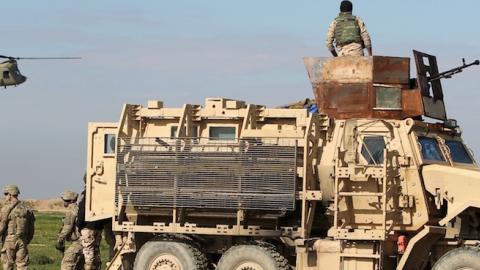President Obama, fresh off the implementation of the nuclear accord and a prisoner swap, may want to believe that Iran is, as he suggested to NPR a year ago while discussing what it would take to get a deal done, now on its way to becoming “a very successful regional power” that will abide “by international norms and international rules.” This flies in the face of Iran’s long record of making war on Americans, using the same tactics time after time.
On Jan. 20, 2007, a dozen or so Iraqi militants wearing military uniforms and driving black GMC Suburbans drove into the Karbala provincial government headquarters in a brazen attempt to kidnap U.S. soldiers. One U.S. soldier died in a gun battle. Four others were seized by the attackers and murdered during the course of a pursuit by U.S. forces.
Coalition forces subsequently captured two leaders of an Iranian-backed terrorist group called Asaib Ahl al-Haq (AAH, or League of the Righteous), the brothers Qais Khazali and Laith Khazali, who under interrogation revealed direct involvement by Iran’s Quds Force in planning the attack. A Lebanese Hezbollah operative closely linked to the Quds Force, Ali Musa Daqduq, was subsequently captured and linked to the attack as well in spite of his attempts to pretend that he was deaf and mute.
Two years after the Karbala attack , in 2009, Laith Khazali was freed as part of a prisoner exchange with Iranian-backed Shiite militants who had kidnapped five British men in Iraq and killed four of them. Qais Khazali was freed in 2010 and Daqduq in 2012.
Today the Khazali brothers are back running AAH, which is more powerful than ever and appears to be back to its old tricks. On Jan. 16, a group of militants driving SUVs and wearing military uniforms kidnapped three Americans in Baghdad. At least two of the men were apparently working as trainers for the Counter Terrorism Service, Iraq’s elite special operations unit, which is not only the most effective part of its military (it led the recent assault on Ramadi) but also virtually the only part of it not infiltrated by Shiite militias. Various media outlets are reporting that the Americans were taken to Sadr City, a Shiite stronghold, and that AAH is most likely responsible, possibly in coordination with another Iranian-backed militia, Saraya al-Salam.
AAH is a wholly owned subsidiary of Iran’s Quds Force. It is inconceivable that it could kidnap and hold Americans — a course of action with significant international repercussions — without at least the acquiescence, and probably the active support, of Tehran. Yet the Obama administration is doing all it can to obfuscate that reality. Reuters cited “U.S. government sources” in reporting that “Washington had no reason to believe Tehran was involved in the kidnapping and did not believe the trio were being held in Iran, which borders Iraq.”
Why would Iran need to bring the hostages to its own territory when it already controls much of Iraq? And what kind of evidence would U.S. officials accept as proof of Iranian involvement? Presumably nothing less than intercepts of Iranian officials talking to the kidnappers, but our enemies have gotten cannier about communications security since Edward Snowden’s revelations about U.S. wiretapping capabilities, so such proof may never be forthcoming.
If another news report is to be believed, the administration is pretty sure who is responsible for the kidnapping but just won’t say so in public. CBS News reports: “Officials in Washington had hoped the Iranian government would tell the militia group to hold off because of all the negotiations surrounding the prisoner swap that saw the release of five Americans. The State Department source said the fear was that one of the groups might have ‘gone off the reservation.’ ”
If accurate, this is an incredible revelation: It suggests that the U.S. government had some advance warning of the danger of Americans being kidnapped in Iraq but chose to ignore it in the hopes that Iran would restrain its proxies. The notion that AAH has “gone off the reservation” represents, of course, nothing more than wishful thinking on the part of an administration that is deeply committed to a policy of rapprochement with Iran.
The United States has become dependent on Iran not just in carrying out the nuclear deal that will form the core of Obama’s foreign policy legacy. It is also dependent on Iranian-backed Shiite militias in Iraq for fighting the Islamic State. While the United States insisted that Shiite militias stay off the front lines in the battle of Ramadi, whose population is entirely Sunni, it has generally preferred to turn a blind eye to the growing power of the militias.
The cost of this cavalier attitude has already been considerable. As Reuters notes: “In allowing the Shiite militias to run amok against their Sunni foes, Washington has fueled the Shia-Sunni sectarian divide that is tearing Iraq apart.” Indeed, the power of the Shiite militias leads many Sunnis to embrace the Islamic State as the lesser evil.
Now we are seeing another possible ramification of Washington’s acquiescence to the Iranian power grab. It will make the U.S. military far less likely to try to rescue the three U.S. hostages even if it can develop actionable intelligence on their location, because any rescue attempt would put U.S. troops into direct conflict with Iranian proxies. That would endanger the safety of all U.S. personnel in Iraq and risk collapsing Obama’s entire strategy of outreach to Iran.
Instead of a rescue attempt, expect the administration to attempt another deal like the one that led this month to the release of five American hostages in return for seven Iranians convicted of acquiring sensitive military technology. The problem with such deals is that they only encourage more hostage-taking — as the kidnapping in Baghdad, on the very day when the nuclear deal was being implemented, should make clear.





















